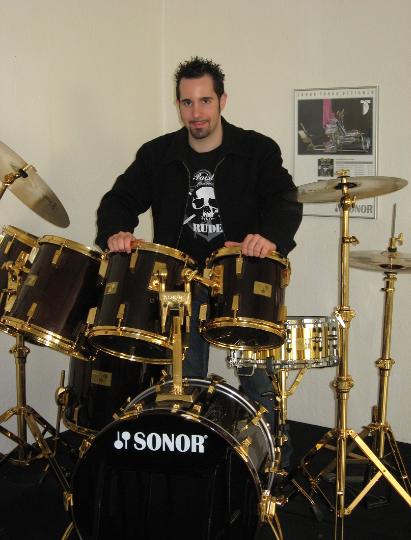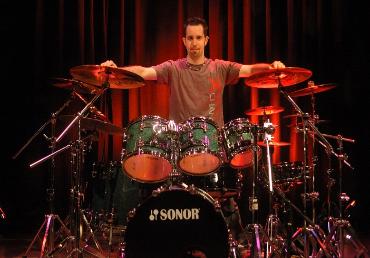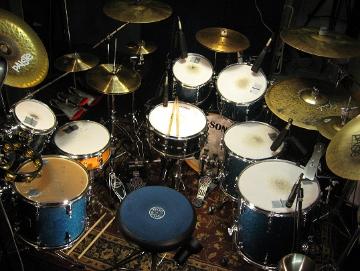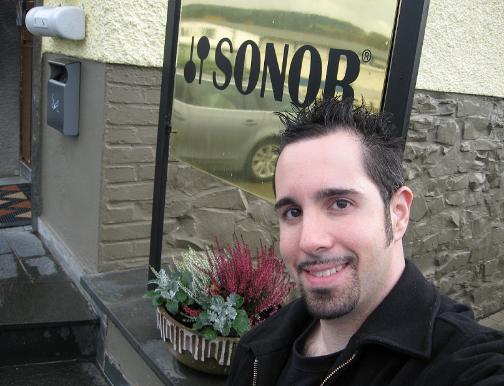


| Charlie Zeleny |

Can you give us some insight into your band directing and
music directing activities? How you you think being a drummer
influences your direction as opposed to having say a trumpet for
your primary interest? Do you have a secondary instrument?
As a producer, what projects would be recongnizable to the average
person? What have you done that might surprise someone?
Charlie Z:
I had to learn a lot of music theory and orchestrating/arranging in
college to be able to be a good Music Director or Bandleader. I also
had to head up tons of different projects throughout my career and
get a lot of experience in the organization, logistics and what other
musicians, artists, management and labels all expect from putting
bands together for artists and events. If I didn't lead the Jazz
Program at Drew University I probably wouldn't have been able to
handle all the events and bands/artists who asked me to put
together and lead bands for them. Its really intense and takes tons
and tons of extra hours outside of just practicing your instrument.
You have to get to a such a deep level of everything from the way
the record is produced to the exact way each musician plays their
parts and either notate it exactly on sheet music or take the time to
tell them how to play what you want them to play. What really helps
me is having a little bit of piano chops in addition to a knowledge of
guitar and bass besides having a great ear and a decent voice to
pick out pitches to sing the way I envision a part to go. To be a good
Music Director or Bandleader takes a lot of courage and confidence
too. Its not a role for the weary especially since everyone is looking
to you for all their questions to be answered and everything comes
down on you if things don't run as smoothly as they should have.
Personality and people-skills are a must as is having a huge network
of musicians who know and respect you to be able to call helps too.
music directing activities? How you you think being a drummer
influences your direction as opposed to having say a trumpet for
your primary interest? Do you have a secondary instrument?
As a producer, what projects would be recongnizable to the average
person? What have you done that might surprise someone?
Charlie Z:
I had to learn a lot of music theory and orchestrating/arranging in
college to be able to be a good Music Director or Bandleader. I also
had to head up tons of different projects throughout my career and
get a lot of experience in the organization, logistics and what other
musicians, artists, management and labels all expect from putting
bands together for artists and events. If I didn't lead the Jazz
Program at Drew University I probably wouldn't have been able to
handle all the events and bands/artists who asked me to put
together and lead bands for them. Its really intense and takes tons
and tons of extra hours outside of just practicing your instrument.
You have to get to a such a deep level of everything from the way
the record is produced to the exact way each musician plays their
parts and either notate it exactly on sheet music or take the time to
tell them how to play what you want them to play. What really helps
me is having a little bit of piano chops in addition to a knowledge of
guitar and bass besides having a great ear and a decent voice to
pick out pitches to sing the way I envision a part to go. To be a good
Music Director or Bandleader takes a lot of courage and confidence
too. Its not a role for the weary especially since everyone is looking
to you for all their questions to be answered and everything comes
down on you if things don't run as smoothly as they should have.
Personality and people-skills are a must as is having a huge network
of musicians who know and respect you to be able to call helps too.
Coming from a Drumming background I am in a really big supporting
role as a musician. I instinctively know when to lay back and when to
push and I hear and know rhythm so deeply that I can easily notate
rhythms and phrasing and hip the other players to what I want them to
do quickly. I also have a very good understanding of what music is
supposed to sound like live and on record and how to achieve that
sound quickly and easily to make people want to move. Drumming at a
high level helps but its also important to make sure the bass, keys,
percussion and guitars are all playing where they are supposed to be
playing in the groove by playing enough to fill the space but not over
playing to step on the vocals or each other. The only drawback is that I
didn't learn how to read and write actual musical notation or learn
actual notes until late highschool and early college, so I'm always
struggling with the things that a melodic instrument would never have
to struggle with.
role as a musician. I instinctively know when to lay back and when to
push and I hear and know rhythm so deeply that I can easily notate
rhythms and phrasing and hip the other players to what I want them to
do quickly. I also have a very good understanding of what music is
supposed to sound like live and on record and how to achieve that
sound quickly and easily to make people want to move. Drumming at a
high level helps but its also important to make sure the bass, keys,
percussion and guitars are all playing where they are supposed to be
playing in the groove by playing enough to fill the space but not over
playing to step on the vocals or each other. The only drawback is that I
didn't learn how to read and write actual musical notation or learn
actual notes until late highschool and early college, so I'm always
struggling with the things that a melodic instrument would never have
to struggle with.

I also have a very developed ear but my chops on piano, guitar or bass are minimal
and I can't quite get my ideas out as well as I'd like to on those instruments. My
secondary instruments would probably be percussion, piano and voice followed by
guitar and bass. All help immensely in everything I do.
With regards to being a Producer, I mainly produce projects myself or for indie artists
that I am trying to break. I also Produce and Engineer all the drum tracks I do online
in my studio though. I've done the drum tracks for tons of Jordan Rudess work, for
the Blotted Science album with Ron Jarzombek from Watchtower and Alex Webster
from Cannibal Corpse and edited my drums for Behold the Arctopus' last album.
Outside of that, its more Music Directing and Bandleading than Producing on record
but its really a lot of the same skill sets but the focus is on making music sound good
live or making music sound good on record. The main difference is to have a working
knowledge of Protools and understand audio effects and plugin programs that will
enhance the sound of your recordings.
and I can't quite get my ideas out as well as I'd like to on those instruments. My
secondary instruments would probably be percussion, piano and voice followed by
guitar and bass. All help immensely in everything I do.
With regards to being a Producer, I mainly produce projects myself or for indie artists
that I am trying to break. I also Produce and Engineer all the drum tracks I do online
in my studio though. I've done the drum tracks for tons of Jordan Rudess work, for
the Blotted Science album with Ron Jarzombek from Watchtower and Alex Webster
from Cannibal Corpse and edited my drums for Behold the Arctopus' last album.
Outside of that, its more Music Directing and Bandleading than Producing on record
but its really a lot of the same skill sets but the focus is on making music sound good
live or making music sound good on record. The main difference is to have a working
knowledge of Protools and understand audio effects and plugin programs that will
enhance the sound of your recordings.


What I have done that would surprise someone would
probably be touring in 19 countries, playing in 39 US States
and playing on over 50 records while only being 28 years
old. I've also gotten all 10 of these endorsements myself not
being connected to any one project and did it by combining
my high profile gigs and my talent on the drums along with
good networking and self-promotion skills. I've also been in
Music Videos and played on TV and have been featured in
all different kinds of music all over the world.
I also did drum tracks at my studio for Tone Maker DJ
Ringtone creator which features my playing behind Method
Man and Ceelo Green from Gnarls Barkely too.
probably be touring in 19 countries, playing in 39 US States
and playing on over 50 records while only being 28 years
old. I've also gotten all 10 of these endorsements myself not
being connected to any one project and did it by combining
my high profile gigs and my talent on the drums along with
good networking and self-promotion skills. I've also been in
Music Videos and played on TV and have been featured in
all different kinds of music all over the world.
I also did drum tracks at my studio for Tone Maker DJ
Ringtone creator which features my playing behind Method
Man and Ceelo Green from Gnarls Barkely too.
What would you say to inspire other drummers? Any parting words?
Charlie Z:
Everything I have done from the very beginning up until now was all done by hard work. I am a
great and solid drummer who can hang in just about any situation you throw me in and I also
have some added chops, musicality and my own voice on the drumset that can be featured by
artists or bands. This whole process didn't happen overnight and took tons of hard practice,
studying other drummers and taking private lessons with great teachers to help me find a
technique that works for me. Be patient! I started out with a decent natural talent and a
decently musical ear and developed all my skills as much as possible at every chance I got
and inched my way to where I am now. Sometimes I fell on my face and didn't do well in certain
gigs or situations and I learned from my mistakes to not make them again. Other times I
exceeded everybody's expectations and had huge doors open for me that I never dreamed I'd
walk through. When I made the switch to a full time musician it was even harder and took even
more courage and patience. I had to get through the slow times and build up a network of
musicians and gigs that call me regularly so I can pay my bills with music. But through it all one
thing remained steady that I still take solace in: whenever I am behind a drumkit anywhere
around the world, that place is home to me and that moment is an incredibly amazing and
joyous moment. That feeling of love for the drums can get you through the hardest times,
hardest tours and worst situations of your life. Don't forget why you started playing and how
much fun it is to be able to play the drums even when things feel like they are falling apart.
Also, learn as much as you can about the drums as an instrument, learn the history of music
and learn theory, composition and songwriting as best you can to have a real world working
knowledge of music. Definitely get into the business side of things as much as you can to make
sure you don't get screwed in musical situations and can keep those bills paid.
Lastly, work on your personality and networking skills since that is even more important than
talent and technique these days. Be nice to everyone on your way up the ladder to drumming
and musical success since the scene is so small and getting smaller everyday. You never
know where the next gig big or small will come from and when you get the call, do everything in
your power to give it your all and you will be on your way to success!
God bless and Good Luck!
END
Charlie Z:
Everything I have done from the very beginning up until now was all done by hard work. I am a
great and solid drummer who can hang in just about any situation you throw me in and I also
have some added chops, musicality and my own voice on the drumset that can be featured by
artists or bands. This whole process didn't happen overnight and took tons of hard practice,
studying other drummers and taking private lessons with great teachers to help me find a
technique that works for me. Be patient! I started out with a decent natural talent and a
decently musical ear and developed all my skills as much as possible at every chance I got
and inched my way to where I am now. Sometimes I fell on my face and didn't do well in certain
gigs or situations and I learned from my mistakes to not make them again. Other times I
exceeded everybody's expectations and had huge doors open for me that I never dreamed I'd
walk through. When I made the switch to a full time musician it was even harder and took even
more courage and patience. I had to get through the slow times and build up a network of
musicians and gigs that call me regularly so I can pay my bills with music. But through it all one
thing remained steady that I still take solace in: whenever I am behind a drumkit anywhere
around the world, that place is home to me and that moment is an incredibly amazing and
joyous moment. That feeling of love for the drums can get you through the hardest times,
hardest tours and worst situations of your life. Don't forget why you started playing and how
much fun it is to be able to play the drums even when things feel like they are falling apart.
Also, learn as much as you can about the drums as an instrument, learn the history of music
and learn theory, composition and songwriting as best you can to have a real world working
knowledge of music. Definitely get into the business side of things as much as you can to make
sure you don't get screwed in musical situations and can keep those bills paid.
Lastly, work on your personality and networking skills since that is even more important than
talent and technique these days. Be nice to everyone on your way up the ladder to drumming
and musical success since the scene is so small and getting smaller everyday. You never
know where the next gig big or small will come from and when you get the call, do everything in
your power to give it your all and you will be on your way to success!
God bless and Good Luck!
END